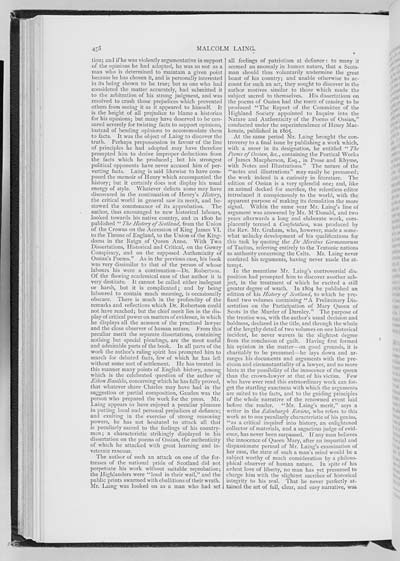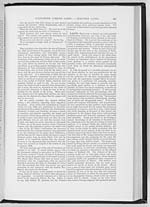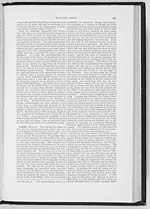453
tion; and if he was violently argumentative in support
of the opinions he had adopted, he was so not as a
man who is determined to maintain a given point
because he has chosen it, and is personally interested
in its being shown to be true; but as one who had
considered the matter accurately, had submitted it
to the arbitration of his strong judgment, and was
resolved to crush those prejudices which prevented
others from seeing it as it appeared to himself. It
is the height of all prejudice to blame a historian
for his opinions; but many have deserved to be cen-
sured severely for twisting facts to support opinions,
instead of bending opinions to accommodate them
to facts. It was the object of Laing to discover the
truth. Perhaps prepossession in favour of the line
of principles he had adopted may have therefore
prompted him to derive improper deductions from
the facts which he produced; but his strongest
political opponents have never accused him of per-
verting facts. Laing is said likewise to have com-
posed the memoir of Henry which accompanied the
history; but it certainly does not display his usual
energy of style. Whatever defects some may have
discovered in the continuation of Henry's History,
the critical world in general saw its merit, and be-
stowed the countenance of its approbation. The
author, thus encouraged to new historical labours,
looked towards his native country, and in 1800 he
published " The History of Scotland, from the Union
of the Crowns on the Accession of King James VI.
to the Throne of England, to the Union of the King-
doms in the Reign of Queen Anne. With Two
Dissertations, Historical and Critical, on the Gowry
Conspiracy, and on the supposed Authenticity of
Ossian's Poems." As in the previous case, his book
was very dissimilar to that of the person of whose
labours his were a continuation�Dr. Robertson.
Of the flowing academical ease of that author it is
very destitute. It cannot be called either inelegant
or harsh, but it is complicated; and by being
laboured to contain much meaning, is occasionally
obscure. There is much in the profundity of the
remarks and reflections which Dr. Robertson could
not have reached; but the chief merit lies in the dis-
play of critical power on matters of evidence, in which
he displays all the acumen of the practised lawyer
and the close observer of human nature. From this
peculiar merit the separate dissertations, containing
nothing but special pleadings, are the most useful
and admirable parts of the book. In all parts of the
work the author's ruling spirit has prompted him to
search for debated facts, few of which he has left
without some sort of settlement. He has treated in
this manner many points of English history, among
which is the celebrated question of the author of
Eikon Basilike, concerning which he has fully proved,
that whatever share Charles may have had in the
suggestion or partial composition, Gauden was the
person who prepared the work for the press. Mr.
Laing appears to have enjoyed a peculiar pleasure
in putting local and personal prejudices at defiance;
and exulting in the exercise of strong reasoning
powers, he has not hesitated to attack all that
is peculiarly sacred to the feelings of his country-
men ; a characteristic strikingly displayed in his
dissertation on the poems of Ossian, the authenticity
of which he attacked with great learning and in-
veterate rancour.
The author of such an attack on one of the for-
tresses of the national pride of Scotland did not
perpetrate his work without suitable reprobation;
the Highlanders were "loud in their wail," and the
public prints swarmed with ebullitions of their wrath.
Mr. Laing was looked on as a man who had set
all feelings of patriotism at defiance: to many it
seemed an anomaly in human nature, that a Scots-
man should thus voluntarily undermine the great
boast of his country; and unable otherwise to ac-
count for such an act, they sought to discover in the
author motives similar to those which made the
subject sacred to themselves. His dissertations on
the poems of Ossian had the merit of causing to be
produced "The Report of the Committee of the
Highland Society appointed to Inquire into the
Nature and Authenticity of the Poems of Ossian,"
conducted under the superintendence of Henry Mac-
kenzie, published in 1805.
At the same period Mr. Laing brought the con-
troversy to a final issue by publishing a work which,
with a sneer in its designation, he entitled " The
Poems of Ossian, &c., containing the Poetical Works
of James Macpherson, Esq., in Prose and Rhyme,
with Notes and Illustrations." The nature of the
"notes and illustrations" may easily be presumed;
the work indeed is a curiosity in literature. The
edition of Ossian is a very splendid one; and, like
an animal decked for sacrifice, the relentless editor
introduced it conspicuously to the world, with the
apparent purpose of making its demolition the more
signal. Within the same year Mr. Laing's line of
argument was answered by Mr. M 'Donald, and two
years afterwards a long and elaborate work, com-
placently termed a Confutation, was produced by
the Rev. Mr. Graham, who, however, made a some-
what unlucky development of his qualifications for
this task by quoting the De Moribus Germanorum
of Tacitus, referring entirely to the Teutonic nations
as authority concerning the Celts. Mr. Laing never
confuted his arguments, having never made the at-
tempt.
In the meantime Mr. Laing's controversial dis-
position had prompted him to discover another sub-
ject, in the treatment of which he excited a still
greater degree of wrath. In 1804 he published an
edition of his History of Scotland, to which he pre-
fixed two volumes containing "A Preliminary Dis-
sertation on the Participation of Mary Queen of
Scots in the Murder of Darnley." The purpose of
the treatise was, with the author's usual decision and
boldness, declared in the title, and through the whole
of the lengthy detail of two volumes on one historical
incident, he never wavers in the slightest degree
from the conclusion of guilt. Having first formed
his opinion in the matter�on good grounds, it is
charitably to be presumed�he lays down and ar-
ranges his documents and arguments with the pre-
cision and circumstantiality of a lawyer, and no more
hints at the possibility of the innocence of the queen
than the crown-lawyer at that of his victim. Few
who have ever read this extraordinary work can for-
get the startling exactness with which the arguments
are suited to the facts, and to the guiding principles
of the whole narrative of the renowned event laid
before the reader. "Mr. Laing's merit," says a
writer in the Edinburgh Review, who refers to this
work as to one peculiarly characteristic of his genius,
"as a critical inquirer into history, an enlightened
collector of materials, and a sagacious judge of evid-
ence, has never been surpassed. If any man believes
the innocence of Queen Mary, after an impartial and
dispassionate perusal of Mr. Laing's examination of
her case, the state of such a man's mind would be a
subject worthy of much consideration by a philoso-
phical observer of human nature. In spite of his
ardent love of liberty, no man has yet presumed to
charge him with the slightest sacrifice of historical
integrity to his zeal. That he never perfectly at-
tained the art of full, clear, and easy narrative, was

![]() Universal Viewer |
Universal Viewer | ![]() Mirador |
Large image | Transcription
Mirador |
Large image | Transcription
![]()

